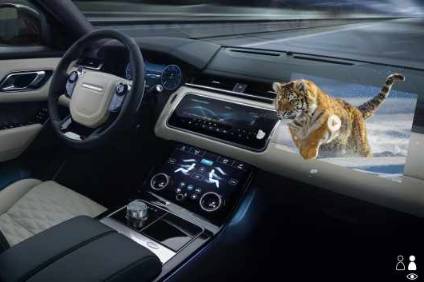
Tata-owned Jaguar Land Rover (JLR) is developing next-generation head-up display technology that it says could beam real-time safety information in front of the driver, and allow passengers to stream 3D movies direct from their seats as part of a shared, autonomous future.
Engineers are working on a powerful new 3D head-up display to project safety alerts, such as lane departure, hazard detection, sat nav directions, and to reduce the effect of poor visibility in poor weather or light conditions. Augmented reality would add the perception of depth to the image by mapping the messages directly onto the road ahead.

Discover B2B Marketing That Performs
Combine business intelligence and editorial excellence to reach engaged professionals across 36 leading media platforms.
Studies conducted in Germany, show that the use of Stereoscopic 3D displays in an automotive setting can improve reaction times on ‘popping-out’ instructions and increases depth judgments while driving.
In the future, innovative technology could be used by passengers to watch 3D movies. Head and eye-tracking technology would follow the user’s position to ensure they can see 3D pictures without the need for individual screens or shutter glasses worn at the cinema.
JLR maintains that in a fully autonomous future, the 3D displays would offer users a personalised experience and allow ride-sharers to independently select their own infotainment. Several passengers sharing a journey would be able to enjoy their own choice of media – including journey details, points of interest or movies – and optimised for where they are sat.
The research – undertaken in partnership with the Centre for Advanced Photonics and Electronics (CAPE) at University of Cambridge – is focused on developing an immersive head-up display, which will closely match real-life experience allowing drivers to react more naturally to hazards and prompts.
“Not only does it provide a much richer experience for customers, but it also forms part of our Destination Zero roadmap; helping us to move towards a safer, more intuitive and smarter future, for everybody,” said Valerian Meijering, Human Machine Interface and Head-Up Display researcher for Jaguar Land Rover
Professor Daping Chu, director of Centre for Photonic Devices and Sensors and director of the Centre for Advanced Photonics and Electronics said: “This programme is at the forefront of development in the virtual reality space – we’re looking at concepts and components which will set the scene for the connected, shared and autonomous cars of the future. CAPE Partners are world-leading players strategically positioned in the value chain network. Their engagement provides a unique opportunity to make a greater impact on society and further enhance the business value of our enterprises.”
The next-generation head-up display research forms part of the development into Jaguar Land Rover’s ‘Smart Cabin’ vision: applying technologies which combine to create a personalised space inside the vehicle for driver and passengers with enhanced safety, entertainment and convenience features as part of an autonomous, shared future.
Together, these efforts are driving towards Destination Zero; Jaguar Land Rover’s ambition to make societies safer and healthier, and the environment cleaner. Delivered through relentless innovation to adapt its products and services to the rapidly-changing world, the company’s focus is on achieving a future of zero emissions, zero accidents and zero congestion.






